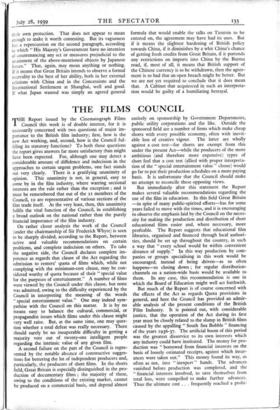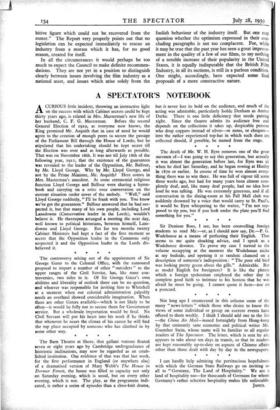THE FILMS COUNCIL
THE Report issued by the Cinematograph Films 1 Council this week is of double interest, for it is necessarily concerned with two questions of major im- portance to the British film industry; first, how is the new Act working, and, second, how is the Council ful- filling its statutory functions? To both these questions the report gives answers far more satisfactory than might have been expected. For, although one may detect a considerable amount of diffidence and indecision in the approaches to certain urgent problems, one fact stands out very clearly. There is a gratifying unanimity of opinion. This unanimity is not, in general, easy to come by in the film industry, where warring sectional interests are the rule rather than the exception ; and it must be remembered that out of the 21 members of the Council, io are representative of various sections of the film trade itself. At the very least, then, this unanimity fulfils the vital function of the Council, in establishing a broad outlook on the national rather than the purely financial importance of the film industry.
On rather closer analysis the work of the Council tinder the chairmanship of Sir Frederick Whyte) is seen to be sharply divided, according to the Report, between active and valuable recommendations on certain problems, and complete indecision on others. To take the negative side, the Council declares complete im- potence as regards that clause of the Act regarding the admission to renters' quota of films which, while not complying with the minimum-cost clause, may be con- sidered worthy of quota because of their "special value for the purposes of entertainment." A number of films were viewed by the Council under this clause, but none was admitted, owing to the difficulty experienced by the Council in interpreting the meaning of the words "special entertainment value." One may indeed syrn- pathise with the Council on this matter. It is by no means easy to balance the cultural, commercial, or propagandist issues which films under this clause might very well raise. But, at the same time, one may ques- tion whether a total defeat was really necessary. There should surely be no insuperable difficulty in getting a majority vote out of twenty-one intelligent people regarding the intrinsic value of any given film.
A second failure on the part of the Council is repre- sented by the notable absence of constructive sugges- tions for bettering the lot of independent producers and, particularly, the producers of short films. In the shorts field, Great Britain is especially distinguished in the pro- duction of documentary films ; the majority of these, owing to the conditions of the existing market, cannot be produced on a commercial basis, and depend almost entirely on sponsorship by Government Departments, public utility corporations and the like. Outside the sponsored field are a number of firms which make cheap shorts with every possible economy, often with inevit- able loss of creative vigour. The latter are wholly against a cost test—for shorts are exempt from this under the present Act—while the producers of the more ambitious (and therefore more expensive) types of short feel that a cost test (allied with proper interpreta- tion of the "special entertainment value" clause) would go far to put their production schedules on a more paying basis. It is unfortunate that the Council should make no attempt to reconcile these opposing views.
But immediately after this statement the Report makes several valuable recommendations regarding the use of the film in education. In this field Great Britain —in spite of many public-spirited efforts—has for some years failed to move with the times, and it is encouraging to observe the emphasis laid by the Council on the neces- sity for making the production and distribution of short educational films easier and, where necessary, more profitable. The Report suggests that educational film libraries, organised and financed through local authori- ties, should be set up throughout the country, in such a way that "every school would be within convenient distance of supply." In this way production by com- panies or groups specialising in this work would be encouraged, instead of being driven—as so often happens—to closing down ; for regular distribution- channels on a nation-wide basis would be available to them. In any case, this recommendation is one in which the Board of Education might well act forthwith.
But much of the Report is of course concerned with the effects of the Act as regards Quota provisions in general, and here the Council has provided an admir- able analysis of the present conditions of the British Film Industry. It is pointed out, with considerable justice, that the operation of the Act during its first year must be closely related to the slump in British films caused by the appalling "South Sea Bubble" financing of the years 1936-37. The artificial boom of this period was the greatest disservice to its own interests which any industry could have instituted. The money for pro- duction was "borrowed from financial interests on the basis of loosely estimated receipts, against which insur- ances were taken out." This money found its way, as often as not, into " inexpert " hands. The advances vanished before production was completed, and the "financial interests involved, to save themselves from total loss, were compelled to make further advances. Thus the ultimate cost . . . frequently reached a prohi- bitive figure which could not be recovered from the renter." The Report very properly points out that no legislation can be expected immediately to rescue an industry from a morass which it has, for no good reason, created for itself.
In all the circumstances it would perhaps be too much to expect the Council to make definite recommen- dations. They are not yet in a position to distinguish clearly between issues involving the film industry as a national asset, and issues which arise solely from the foolish behaviour of the industry itself. But one may question whether the optimism expressed in their con- cluding paragraphs is not too complacent. For, while it may be true that the past year has seen a great improve.. ment in the quality of a few of our films, to say nothing of a notable increase of their popularity in the United States, it is equally indisputable that the British Film Industry, in all its sections, is still in a parlous condition. One might, accordingly, have expected some final proposals of a more constructive nature.









































 Previous page
Previous page